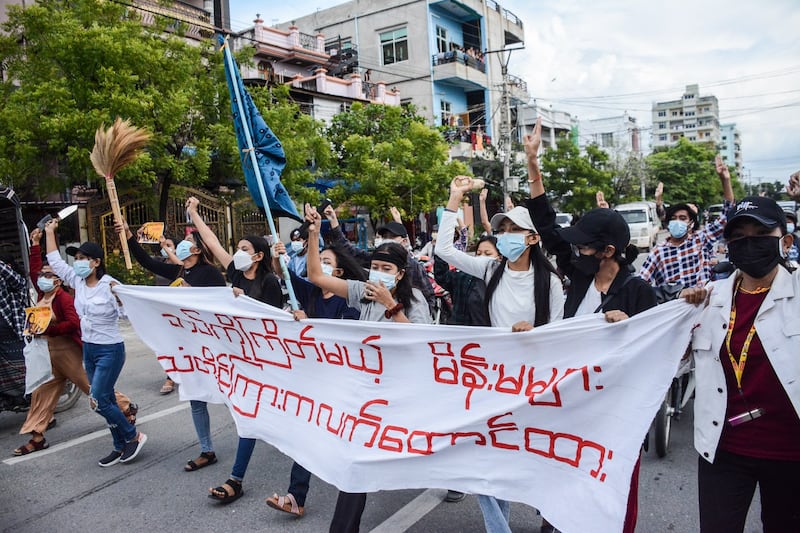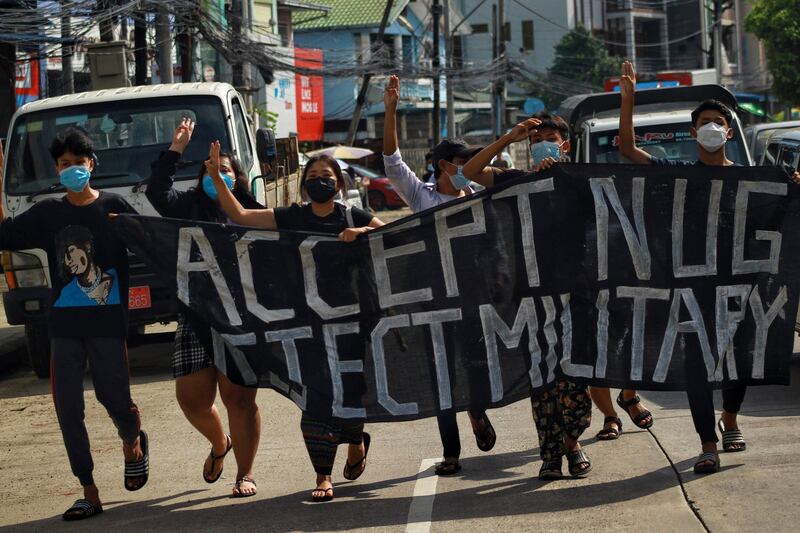Myanmar’s shadow National Unity Government (NUG) on Tuesday declared a nationwide state of emergency and called for open rebellion against junta rule, prompting an escalation of attacks on military targets by various allied pro-democracy militias and ethnic armed groups.
NUG interim president Duwa Lashi La delivered a video address via social media in which he asserted that the military had not only seized control of the country by force through a Feb. 1 coup d’état, but also violated the livelihoods and property of Myanmar’s 54 million citizens, necessitating its immediate overthrow.
In his 14-point address, the NUG leader said peaceful resistance had failed to convince the junta of the need to hand power back to the democratically elected National League for Democracy (NLD) government and that the people of Myanmar would no longer accept oppression “with their heads bowed.”
“The people’s resistance against the military dictatorship starts today, Sept. 7,” he said.
“This revolution is a people’s revolution, and the entire population of the Union of Myanmar must resist Min Aung Hlaing’s brutal military,” he said referring to the coup architect and junta leader, an army senior general.
The leader of the five-month-old NUG called on the numerous branches of the People’s Defense Force (PDF) militias and armed ethnic groups to “target the military and their support pillars to take control of their regions,” while also urging “all levels of local administrators to stop working immediately.”
He also urged the PDF to “protect the lives and property of the people” and to “strictly follow the regulations and instructions issued by the People’s Defense Army” under the NUG’s command.
The acting NUG president asked the public to avoid unnecessary travel and advised households to “store adequate amounts of food and medicine,” while preparing to aid PDF units.
Additionally, Duwa Lashi La called on the country’s Border Guard Force (BGF) and all militias under the junta to “join forces with the people” against the military, while asking that police personnel and civil servants formally align themselves with the NUG as soon as possible.
Witnesses told RFA’s Myanmar Service that residents of major cities, such as Yangon and Mandalay, were desperately buying food and medicine following the announcement on Tuesday.
The NUG declaration came weeks after the announced plans for a “D-Day” operation to purge the country of the junta through a popular uprising supported by a network of PDF groups formed to protect the public from the military.
In the seven months since the coup, security forces have killed 1,051 civilians and arrested at least 6,313, according to the Bangkok-based Assistance Association for Political Prisoners (AAPP)—mostly during crackdowns on anti-junta protests.
The junta says it had to unseat Aung San Suu Kyi’s NLD government because the party engineered a landslide victory in Myanmar’s November 2020 election through widespread voter fraud. It has yet to present evidence of its claims and public unrest is at an all-time high.

‘Empty statement’
In Washington, a U.S. State Department spokesperson noted the declared launch of a “people’s defensive war” against the military regime, but called for peace to allow the delivery of aid and medicine.
“The United States does not condone violence as a solution to the current crisis in Burma and calls on all sides to remain peaceful,” said the spokesman, using the country’s former name.
“The worsening COVID-19 situation inside Burma underscores the need for a peaceful environment that allows for equitable, safe, and unhindered delivery of humanitarian assistance. We continue to urge the regime to end all violence, restore Burma to its path to democracy, and to release all those unjustly detained,” the spokesman said.
Thein Tun Oo, executive director of the pro-military Strategic Studies Institute, called the NUG’s announcement an “empty statement” that would have no effect, noting that the military had arrested “a number of PDF members and terrorists.”
“You can make an announcement only when you are in control of the situation,” he said.
“They are making an announcement without the ability to accomplish anything. Their supporters couldn’t follow their instructions if they wanted to.”
Thein Tun Oo said the number of bombings claimed by anti-junta groups had dropped and suggested “there won’t be many clashes or explosions in the cities as more and more PDF members are being arrested.”
Attempts by RFA’s Myanmar Service to contact military spokesman Maj. Gen. Zaw Min Tun for comment went unanswered Tuesday.
At a Aug. 27 news conference in the capital Naypyidaw, Zaw Min Tun acknowledged that the military had “yet to take full control of the country” because the NUG, Parliament’s Pyidaungsu Hluttaw Committee of Representatives (CRPH), and the PDF were seeking to undermine its rule through the D-Day campaign and other actions.
Despite Thein Tun Oo’s assessment that the NUG announcement would have little effect, representatives of various anti-junta groups pledged to join the fight and told RFA they believe it could ignite a full-scale revolution.
Other groups, including a PDF branch in Sagaing region’s Pale township, called on the NUG to follow up on its announcement with material support.
“We have made preparations to some extent and could begin the fight very soon, but we need an adequate number of weapons, as we have to face a powerful and well-organized enemy,” said Bo Naga of the Pale PDF. “We have high morale but not enough weapons.”
Armed ethnic groups said they expect fight against the junta to intensify. But they said the NUG’s announcement made little difference to them because many of them are already fighting the military, which stepped up offensives in Myanmar’s remote border regions after seizing power in February.
“It’s nothing exciting for us because we have been fighting in our state every day like the ‘D-Day’ they are talking about,” said a spokesman for the Karenni National Defense Force (KNDF) in Kayah state in the countries east..
“The announcement is expected to intensify the fighting. We are better prepared than ever, and all our comrades are already in place.”
Expectations that clashes would increase were echoed by the Kachin Independence Army (KIA) in northern Kachin state and the MNDAA Kokang military in neighboring Shan state – both regions that border China.

Uptick in fighting
Immediately following the announcement, fighting was seen to intensify between the military and armed ethnic groups, as well as local branches of anti-junta militias.
A spokesman for the Beikthano PDF in Magway region’s ancient city of Bishnoi told RFA that his group carried out five bombings on military sites in the townships of Natmauk, Yesagyo, Myothit and Taungdwingyi shortly after noon. At least two soldiers were killed, and several others wounded, he said.
Meanwhile, clashes broke out in several villages in the deep southern Tanintharyi region townships of Pathein Chaung and Palaw under the control of the Karen National Union (KNU) on Tuesday, causing an unknown number of residents to flee the area.
Sources said the military suffered casualties but that no PDF members were killed in the fighting, although RFA was unable to independently verify the reports.
PDF forces in Kayah state’s Loikaw and Demawso townships also carried out attacks on the military on Tuesday.
The clashes came a day after a two-hour long battle broke out between Kanpetlet CDF and the YDF-Saw coalition forces and junta soldiers in Chin state after two military columns attacked a CDF battalion base.
A spokesman for the Kanpetlet CDF said eight members of the CDF and three members of the YDF-Saw were injured in the clashes and that the military suffered at least 20 dead. RFA was unable to confirm the exact number of casualties.
Also on Monday, the military expanded its offensive against Kokang forces in northern Shan state’s Mongkoe sub-township near Myanmar’s border with China. Local media reported that a 34-year-old villager was wounded when junta troops shelled Phaungsai village, some 10 miles from Mongkoe.
Nearly 700 refugees have fled the fighting in recent days and have been unable to return to their homes, according to sources.
The United Nations Office for the Coordination of Humanitarian Affairs (OCHA) announced on Aug. 27 that the number of people who need humanitarian aid in Myanmar increased to nearly two million since the military coup on Feb. 1.
OCHA said earlier last month that there are 205,260 internally displaced persons in Myanmar, most of whom are in Kayin, Kayah, Shan and Chin states.
They join more than 500,000 refugees from decades of conflict between the military and ethnic armies who were already counted as IDPs at the end of 2020, according to the Internal Displacement Monitoring Center, a Norwegian NGO.
Amid the fighting, the Association of Southeast Asian Nations (ASEAN) Special Envoy to Myanmar has called for a four-month ceasefire to allow the delivery of much-needed aid to the country—struggling with the triple crisis of political tensions, a failing economy, and a COVID-19 outbreak—as early as mid-September.
Erywan Yusof, Brunei’s second foreign minister, told Japan’s Kyodo News online over the weekend that he proposed the cease-fire until the end of this year in a videoconference with Myanmar’s military-appointed foreign minister, Wunna Maung Lwin, last week, and that the military had accepted it.
Erywan was appointed special envoy to Myanmar in early August, months after ASEAN leaders agreed to a “five-point consensus” that would see the junta end violence in the country, enter into dialogue to find a peaceful solution to the country’s political
The consensus calls for an immediate cessation of violence, the start of dialogue for a peaceful solution, the facilitation of the dialogue by a special envoy, humanitarian aid and the envoy’s visit to Myanmar to meet with all parties concerned.
In his speech, NUG interim president Duwa Lashi La said he hoped ASEAN countries and the rest of the world, including the United Nations, would understand as the announcement was made based on the needs of the country.
Reported by RFA’s Myanmar Service. Translated by Khin Maung Nyane. Written in English by Joshua Lipes.

